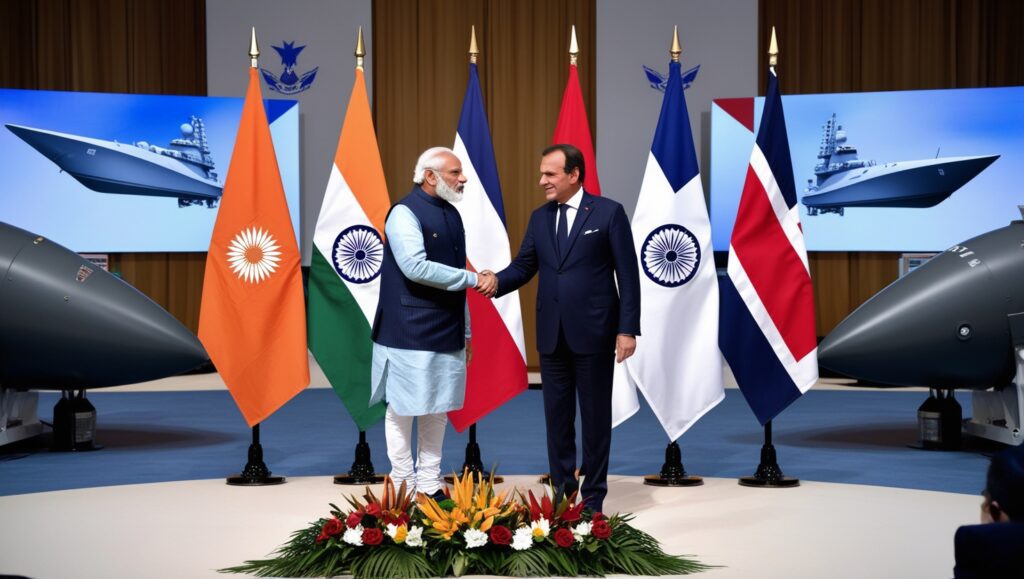India Secures Strategic Defense Partnership with France as US Relations Cool Over Delayed Jet Engines
Prime Minister Narendra Modi’s recent visit to the United States coincides with a major defense breakthrough with France, positioning India as a key player in global military strategy. While discussions in the US centered around defense deals, France has offered India critical defense technology, signaling a potential shift in India’s military partnerships.
India’s Diplomatic Balancing Act Between the US and France
India finds itself at the center of a high-stakes geopolitical tug-of-war, with the United States and France both offering critical defense technologies. While the US has been a traditional defense partner for India, recent delays in supplying jet engines for the Tejas fighter jets have created tension. In contrast, France has stepped up with an offer that includes 100% technology transfer for nuclear submarines and fighter jet engines, a game-changer for India’s defense capabilities.
France Offers Full Technology Transfer for Nuclear Submarines
Just as Prime Minister Modi was meeting with Quad leaders, a strategic leak from France revealed an offer of full support for India’s military ambitions, including nuclear submarine technology and jet engine advancements. The timing of this news is crucial, as it strengthens India’s hand in ongoing negotiations with the United States, which has been delaying key defense deals citing supply chain issues.
India-France Defense Cooperation: A Masterstroke
France’s offer includes:
- 100% Technology Transfer for nuclear submarines.
- Support in the production of advanced jet engines with 110 kN thrust for India’s AMCA (Advanced Medium Combat Aircraft).
- Collaboration on underwater drones and military satellites to boost India’s intelligence and surveillance capabilities.
US Defense Delays: A Frustrating Trend for India
India has faced multiple delays from the US in acquiring key defense components, particularly the F404 jet engines required for its Tejas Light Combat Aircraft. While the US has supplied these engines to South Korea without issue, India has been left waiting, adding to the frustration. The delays have impacted India’s Tejas jet production, with planes ready but waiting for engines.
U.S. President Joe Biden’s Cognitive Struggles at the Quad Summit: A Rising Concern?
Geopolitical Pressure Mounts on the US
The US is facing pressure from India to resolve the delays, especially as France has made it clear that it is willing to step in. India has already signaled its willingness to move forward with France if the US does not act swiftly.
- F404 Engines: Delayed for India but delivered to South Korea without issue.
- F414 Engines: The US has agreed to transfer 80% of the technology, but France is offering 100%, giving India a powerful bargaining chip.
France’s Revenge for the AUKUS Deal
France’s move is not just a strategic offer; it is also a form of retribution for the AUKUS deal, where the US and the UK sidelined France in a nuclear submarine deal with Australia. By offering India a similar deal, France is making a statement, reasserting itself as a key player in global defense.
Strategic Dialogue Between India and France
On September 30, a strategic dialogue will take place between India’s NSA Ajit Doval and France’s diplomatic adviser in Paris. This meeting is expected to finalize the details of the new defense agreements, including:
- Nuclear submarine production in India.
- Development of jet engines for India’s AMCA program.
- Enhanced cooperation in intelligence gathering and anti-submarine warfare using underwater drones.
Impact on India’s Defense Strategy
India’s defense strategy is poised for a significant upgrade if the deal with France goes through. The acquisition of nuclear attack submarines (SSNs) will strengthen India’s naval capabilities, especially in the Indian Ocean, where China’s presence is growing. Unlike diesel submarines, SSNs can stay underwater for extended periods, offering superior endurance and speed.
Why Nuclear Attack Submarines are Crucial for India
- Extended Underwater Endurance: SSNs can remain submerged for months, unlike diesel-powered submarines, which can only stay underwater for a few days.
- Speed and Agility: Nuclear submarines are faster and can outmaneuver diesel submarines, providing India with a crucial advantage in potential naval confrontations.
- Strategic Importance in the Indian Ocean: With China increasing its presence, India’s acquisition of nuclear submarines will be critical for maintaining dominance in the region.
Future of India-US Relations in Defense
The ongoing defense negotiations between India and the US are at a critical juncture. With France offering a superior deal, India is in a stronger position to negotiate with the US. If the US fails to match France’s offer, it risks losing a key defense partner in the Indo-Pacific region.
The Role of Technology Transfer in India’s Decision
One of the key issues in India’s defense negotiations is technology transfer. While the US has been hesitant to offer full technology transfer, France has made it clear that it is willing to provide 100% transfer for key technologies, including jet engines and nuclear submarines. This makes France a more attractive partner for India in the long run.
Conclusion: India’s Diplomatic Triumph
As Prime Minister Modi continues his high-profile diplomatic engagements, India finds itself in a position of strength. With offers on the table from both the US and France, India can afford to choose the partner that best aligns with its long-term strategic goals. The coming months will be crucial in determining the future of India’s defense partnerships, but one thing is clear: India is emerging as a major player on the global stage.
Stay updated with My Global Times for more in-depth coverage of India’s defense strategy and international relations.

